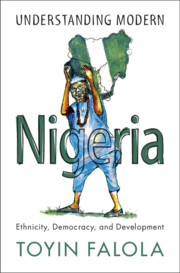Book contents
- Understanding Modern Nigeria
- Understanding Modern Nigeria
- Copyright page
- Dedication
- Contents
- Figures
- Maps
- Preface
- Acknowledgments
- Part I Introduction
- Part II Context and History
- Part III Democracy and Governance
- Part IV Development Crises
- 11 Corruption
- 12 The Political Economy of Oil
- 13 Environment and Sustainable Development
- 14 Food, Society, and Human Capabilities
- 15 Women’s Marginalization
- 16 Human and Minority Rights
- 17 Political Violence
- 18 Challenges of Western Education
- Part V Reforms and Revolutions
- Part VI Conclusion
- Bibliography
- Index
15 - Women’s Marginalization
from Part IV - Development Crises
Published online by Cambridge University Press: 09 June 2021
- Understanding Modern Nigeria
- Understanding Modern Nigeria
- Copyright page
- Dedication
- Contents
- Figures
- Maps
- Preface
- Acknowledgments
- Part I Introduction
- Part II Context and History
- Part III Democracy and Governance
- Part IV Development Crises
- 11 Corruption
- 12 The Political Economy of Oil
- 13 Environment and Sustainable Development
- 14 Food, Society, and Human Capabilities
- 15 Women’s Marginalization
- 16 Human and Minority Rights
- 17 Political Violence
- 18 Challenges of Western Education
- Part V Reforms and Revolutions
- Part VI Conclusion
- Bibliography
- Index
Summary
“Women’s Marginalization” aims at evaluating the marginalization of women in postcolonial Nigeria. It further provides an overview of the position of women in Nigeria and examines the role of colonialism in promoting women’s marginalization in the country. It considers the role of the patriarchal religions of Islam and Christianity as impediments to the full expression of women in major spheres of the society. It also identifies women’s financial incapacity as one of the reasons for their underrepresentation in politics. The predominant patriarchal culture in the country fosters the subordination of women, and therefore places women on the margins of society. In other words, in the sociopolitical, economic, and educational spheres, women have experienced and continue to experience discrimination and underrepresentation based on gender, which places Nigerian women in disempowered positions. Also, several constitutional provisions have been linked to the pervasive gender inequality in the country. However, while this discourse explores the implications of women’s marginalization in a developing economy like Nigeria's, it notes that although the nation has ratified and promulgated many policies and laws with the intention of eradicating gender inequality, the situation has persisted and seems to be waxing stronger.
- Type
- Chapter
- Information
- Understanding Modern NigeriaEthnicity, Democracy, and Development, pp. 358 - 389Publisher: Cambridge University PressPrint publication year: 2021



